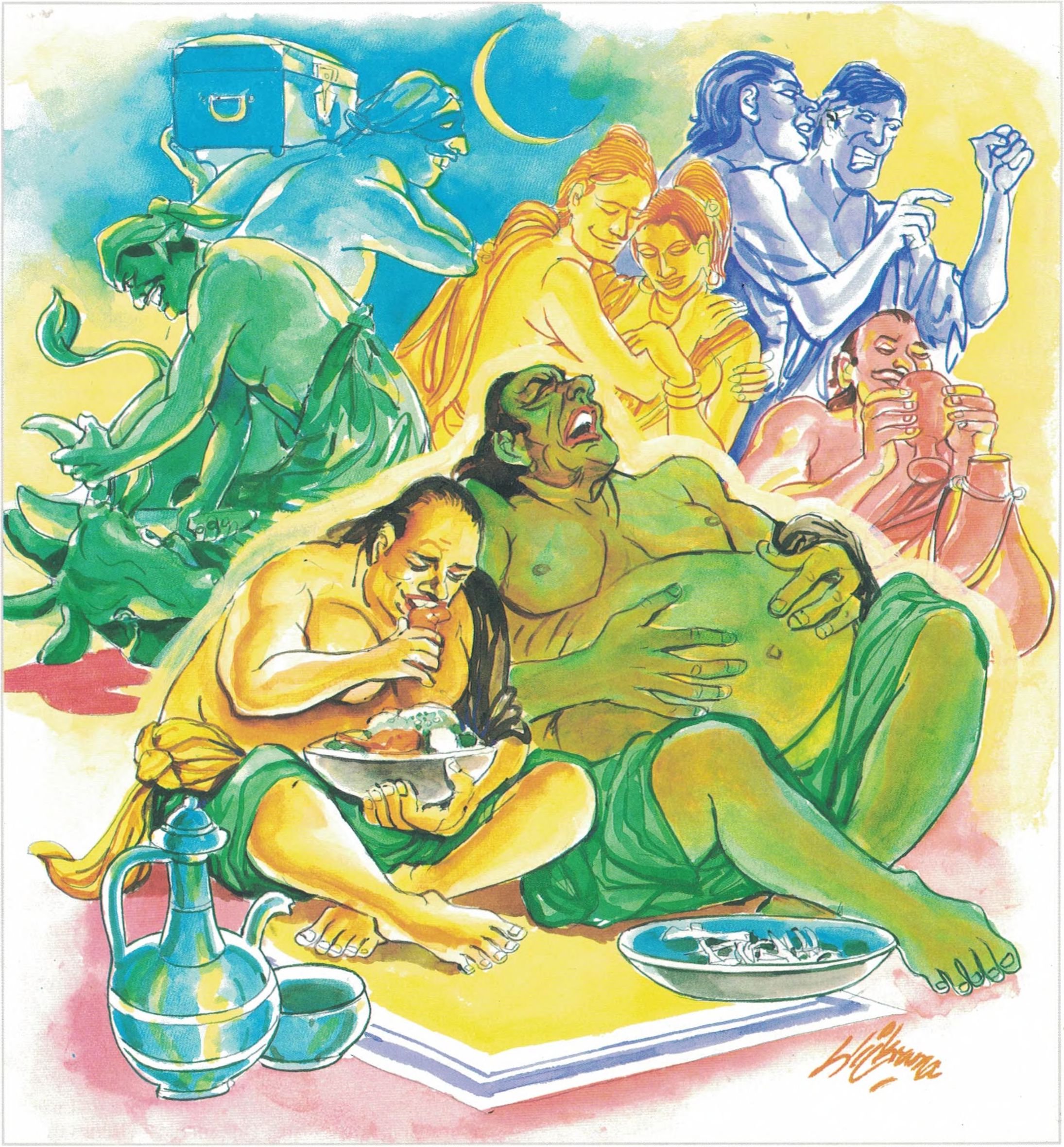Dhammapada (Illustrated)
by Ven. Weagoda Sarada Maha Thero | 1993 | 341,201 words | ISBN-10: 9810049382 | ISBN-13: 9789810049386
This page describes The Story of Nun Uppalavanna which is verse 69 of the English translation of the Dhammapada which forms a part of the Sutta Pitaka of the Buddhist canon of literature. Presenting the fundamental basics of the Buddhist way of life, the Dhammapada is a collection of 423 stanzas. This verse 69 is part of the Bāla Vagga (Fools) and the moral of the story is “The unwise thinks evil deeds are sweet while they ripen not. As they ripen he’s plunged in grief”.
Verse 69 - The Story of Nun Uppalavaṇṇā
Pali text, illustration and English translation of Dhammapada verse 69:
madhuvā maññati bālo yāva pāpaṃ na paccati |
yadā ca paccati pāpaṃ atha bālo dukkhaṃ nigacchati || 69 ||
69. When evil kamma’s immature the fool thinks it is honeyed, but when the evil has matured then to the fool comes dukkha.
 The unwise thinks evil deeds are sweet while they ripen not. As they ripen he’s plunged in grief. |
The Story of Nun Uppalavaṇṇā
While residing at the Jetavana Monastery, the Buddha spoke this verse, with reference to Nun Uppalavaṇṇā.
Once there was a young daughter of a rich man in Sāvatthi. Because she was so beautiful, with looks so tender and sweet, like a blue lotus flower, she was called “Uppalavaṇṇā”, the blue lotus. The fame of her beauty spread far and wide and there were many suitors: princes, rich men and many others. Thereupon, the merchant, her father, thought to himself, I shall not be able to satisfy the wishes of all, but I must find some way out of the difficulty.” Now she was in her last existence before attaining Nibbāna and therefore her father’s words were, to her, like oil a hundred times refined sprinkled on her head. Therefore she replied, “Dear father, I’ll become a nun.” So he prepared rich gifts in her honour, and conducted her to the community of nuns where she was admitted.
One day, her turn came to unlock and lock the hall of compassion. After she had lighted the lamp and swept the hall, her attention was attracted to the flame of the lamp. She concentrated on the flame. Her attention on the element of fire, she entered into a state of trance. She attained arahatship.
Some time later, she moved to the Dark Forest (Andhavana) and lived in solitude. While Nun Uppalavaṇṇā was out on her alms-round, Nanda, the son of her uncle, came to her monastery and hid himself underneath her sofa. Nanda had fallen in love with Uppalavaṇṇā before she became a nun; his intention obviously was to take her by force.
On her return Nun Uppalavaṇṇā entered the hut, closed the door, and sat down on the bed, unable to see in the dark because she had just come in out of the sunlight. Hardly had she seated herself on the bed when the youth crawled out from under the sofa and climbed on top. The nun cried out, “Fool, do not ruin me!” But the youth overcame her resistance, worked out his will over her, and went his way. As if unable to endure his wickedness, the great earth burst asunder, and he was swallowed up and reborn in the great Hell of Avīci.
The nun told the other nuns what had happened, and the nuns told the monks, and the monks told the Buddha. Having heard this, the Buddha addressed the monks as follows, “Monks, the simpleton, whoever he may be, whether monk or nun, or lay disciple male or female, who commits an act of sin, acts with as much joy and happiness, with as much pleasure and delight, as though he were eating honey or sugar or some other sweet-tasting substance.” Then he said, “Monks, they that have rid themselves of the corruptions, neither like the pleasures of love nor gratify their passions. For, even as a drop of water which has fallen upon a lotus-leaf does not cling thereto or remain thereon, but crawls over and falls off, precisely so love does not cling to the heart of one who has rid himself of the corruptions.
Explanatory Translation (Verse 69)
pāpaṃ yāva na paccati bālo madhū iva maññati
yadā ca pāpaṃ paccati atha bālo dukkhaṃ nigacchati
pāpaṃ [pāpa]: evil; yāva na paccati: as long as it does not begin to yield results; bālo: the ignorant; madhū iva: like honey; maññati: considers; yadā ca: when; pāpaṃ [pāpa]: the evil; paccati: matures; atha: at that time; bālo: the ignorant; dukkhaṃ [dukkha]: to suffering; nigacchati: comes
When a sinful act is being done, the ignorant person enjoys it as if it were honey. But the suffering comes when it begins to yield its evil results.
Commentary and exegetical material (Verse 69)
pāpaṃ: unwholesome action. At times this kind of action is characterized as akusala. Akusala implies unwholesomeness. They are those karmical volitions and the consciousness and mental concomitants associated therewith, which are accompanied either by greed or hate or merely delusion; and all these phenomena are causes of unfavourable Karma-results and contain the seeds of unhappy destiny or rebirth.
